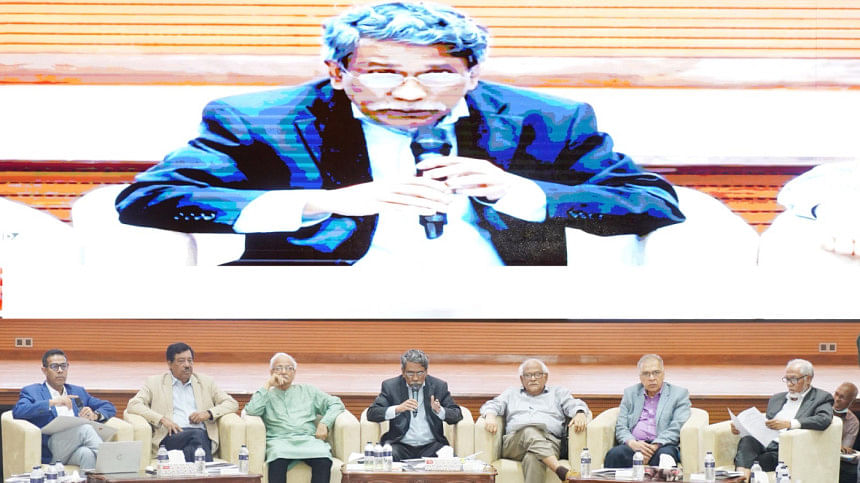Consensus talks: Appointment of caretaker chief to take centre stage

- Consensus reached on 2 of 9 issues
- Dozen key issues not discussed yet
- July Charter by next month
The National Consensus Commission is likely to propose two options for appointing the chief adviser to caretaker governments: one involving parliament, and the other selecting an individual from among retired chief justices.
It will also invite political parties to propose how chief advisers should be appointed.
This will be part of broader discussions on the framework for an interim or caretaker government. The matter will be discussed as the consensus commission resumes talks with political parties today after a three-day break. This marks the seventh day of the second round of discussions.
Professor Ali Riaz, vice president of the consensus commission, told The Daily Star that the discussions would focus on the formation of an Appointment Committee for Constitutional and Statutory Bodies and the process of electing members to the upper house.
In the coming days, the commission and parties will discuss a wide range of issues, including the framework for interim or caretaker governments, he added.
Asked what the commission recommends as the method for appointing the chief adviser, Prof Riaz said that the Constitution Reform Commission had earlier proposed that the National Constitutional Council would appoint the chief adviser. The Electoral Reform Commission also made a similar recommendation.
"But we are no longer in that position. We will have to develop a new proposal. We are currently reviewing and evaluating the options we have," he said.
At discussions with the Constitution Reform Commission, citizens expressed support for formation of an All-Party Parliamentary Committee, the members of which will be members from both the treasury and opposition benches. This committee will be involved in the appointment of the chief adviser.
"We will put this on the table during the discussions," he said.
Prof Riaz also mentioned that some political parties, during the first round of talks, favoured following the process outlined in the 13th amendment for appointing the chief adviser. That option will also be part of the discussions.
There are opinions against involving the judiciary in the process, he said. "We will take that into consideration as well."
Almost all political parties have supported the revival of the caretaker government system in the first round of discussions.
The system of a caretaker government was introduced after the fall of the Ershad regime in 1990.
Later, the caretaker government system became a contentious issue, leading to repeated political crises. The BNP adopted the system after prolonged protests led by the Awami League in 1996.
Once again, the country was in a political crisis in 2007–2008 when a military-backed caretaker government was in office. This crisis began in 2006 amid disputes over who would lead the caretaker government. In 2011, two years after taking power, the Awami League abolished the caretaker government system through the 15th amendment.
The Sheikh Hasina-led government ignored the opposition parties' demand for a caretaker government system ahead of the national elections in 2014, 2018, and 2024.
In December last year, the High Court scrapped a part of the 15th amendment to the constitution that abolished the non-partisan caretaker government system.
CHIEF ADVISER'S APPOINTMENT
According to the 13th amendment, the immediate past chief justice should be the chief adviser. But if the last top judge is unavailable or unwilling to take the responsibility, the president may pick someone from among the previously retired chief justices.
If none of them are available, the president may pick any other former judge of the Appellate Division, beginning with the one who retired last.
If these options fail, the president may, after consulting major parties, appoint a qualified citizen. If all these options are exhausted, the president may, as a last resort, assume the responsibilities of the caretaker government in addition to performing his role as the president.
The Constitution Reform Commission earlier outlined provisions for appointing a chief adviser with seven options by order of priority.
The first option, requiring seven of the proposed National Constitutional Council's nine votes, is to appoint any individual who is not on the council. If that is not possible, the council may resort to the second option, requiring six votes, to appoint a former chief justice or a former judge of the Appellate Division. If that fails, the council may, upon unanimous agreement, appoint the president as the chief adviser. If that cannot be done, it may appoint the last retired chief justice as the head of the caretaker government.
If the last retired top judge declines to assume the role, the commission will approach the one who retired immediately before. If all former chief justices are unavailable or if all of them refuse, the commission will consider the last retired appellate judge. If the last retired judge refuses to take the responsibility, it will find one willing to shoulder the responsibility.
In its second round of discussions, which began on June 2, the commission has so far deliberated on nine issues and reached consensus on only two. It held joint discussions with 30 political parties.

 For all latest news, follow The Daily Star's Google News channel.
For all latest news, follow The Daily Star's Google News channel. 



Comments